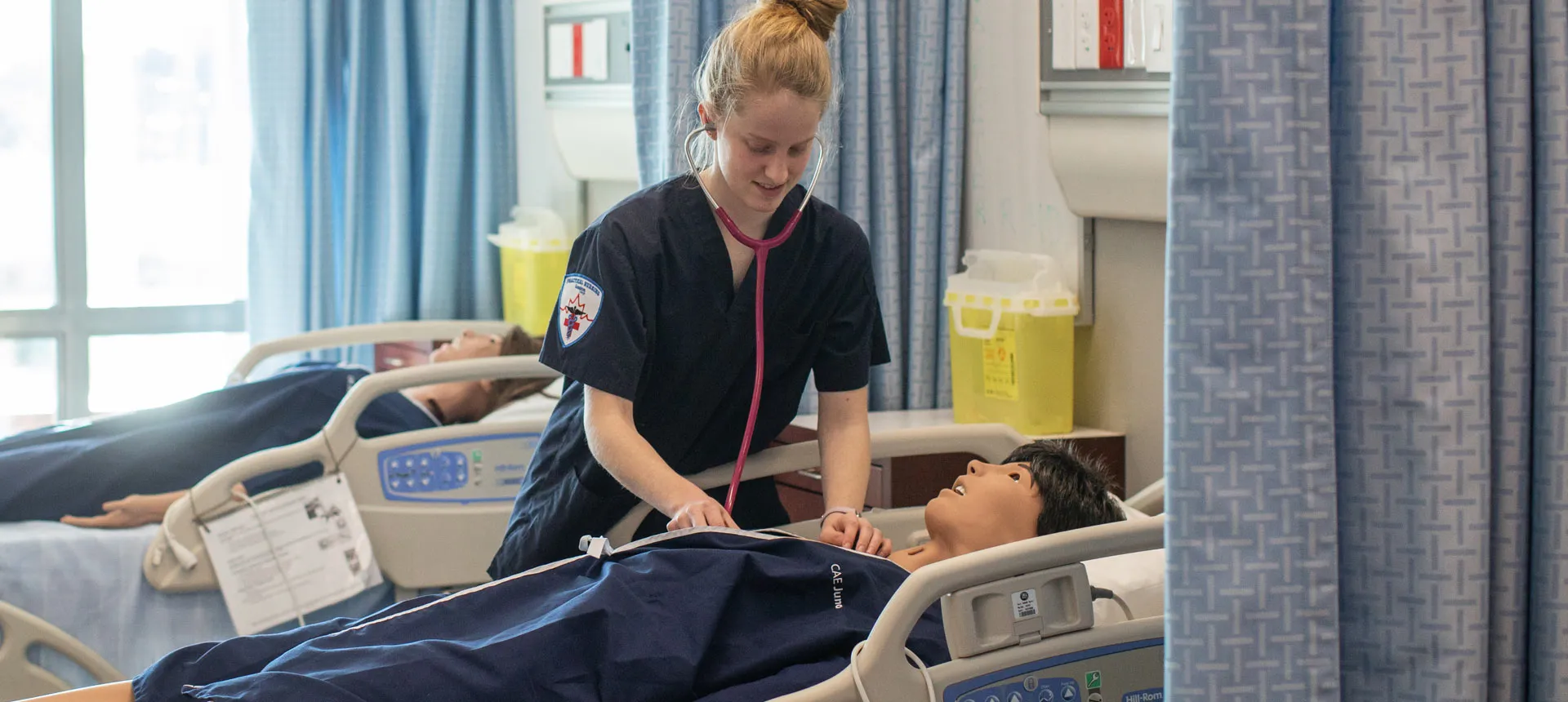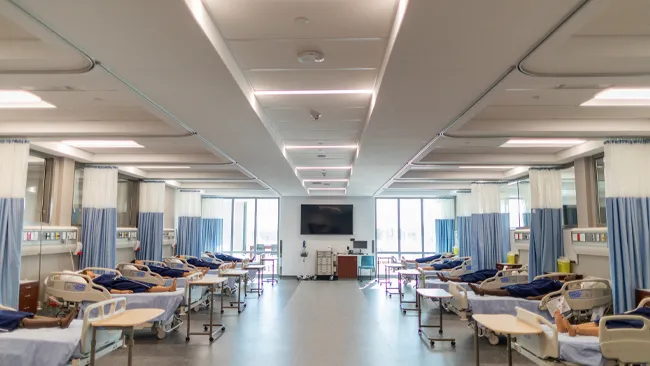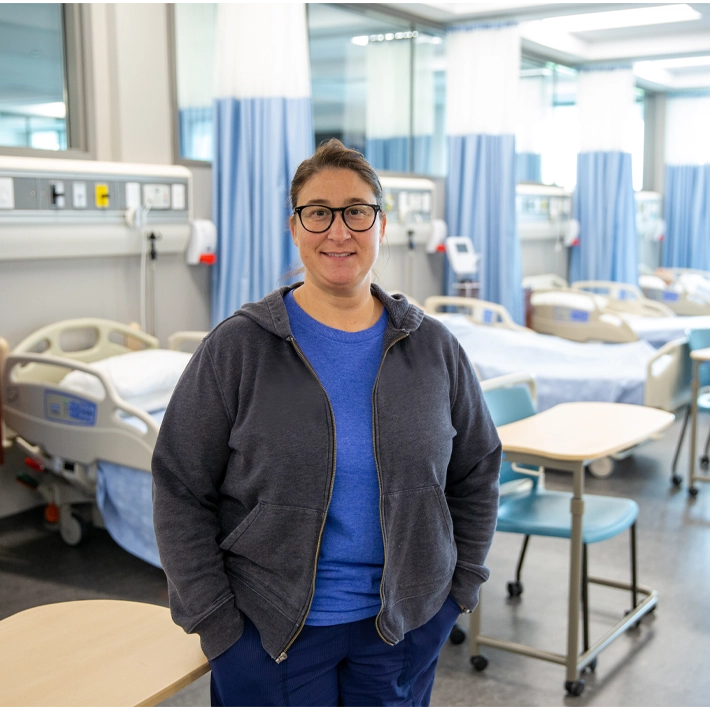
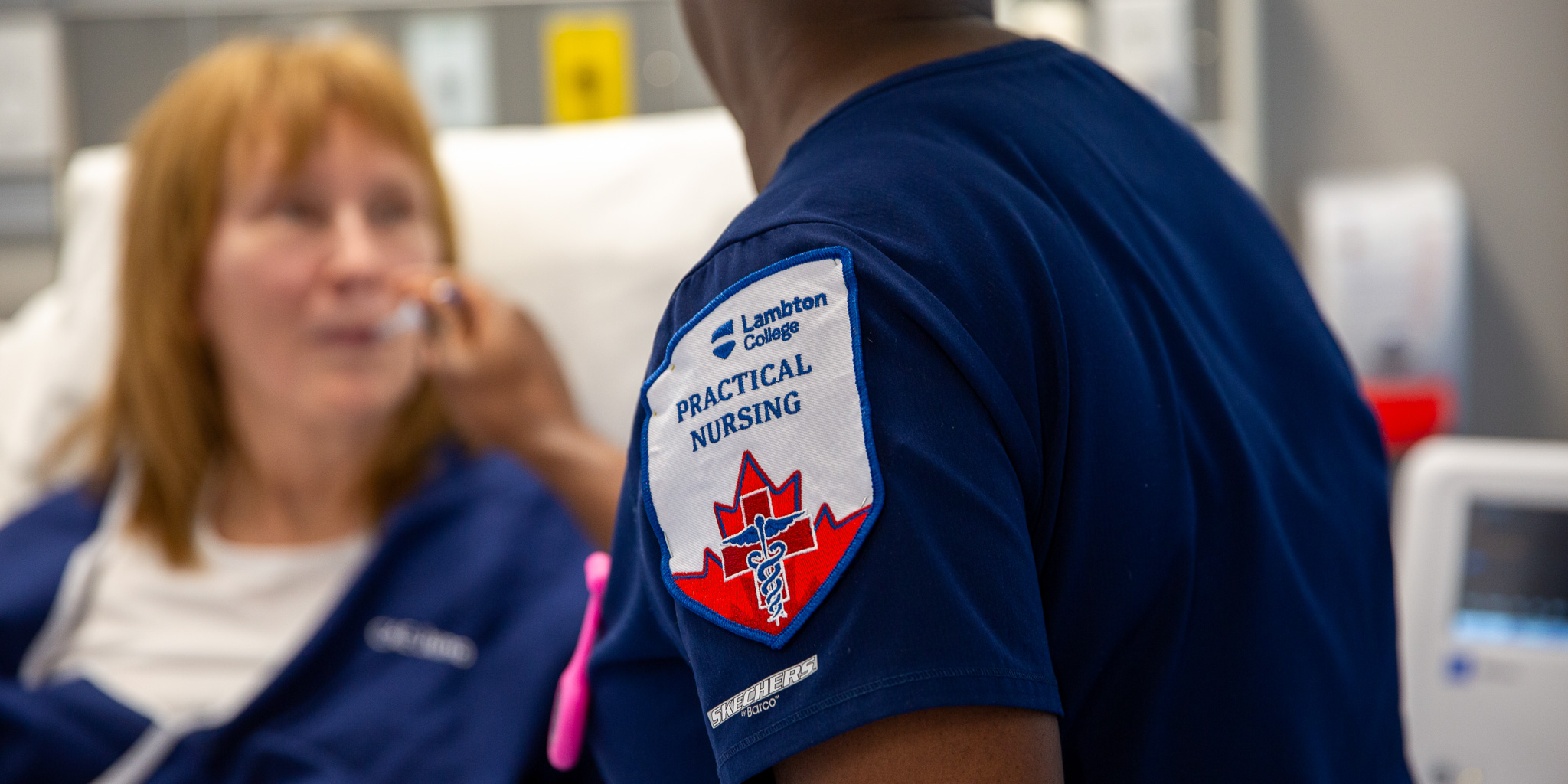
Practical Nursing
Overview
Train with amazing faculty and in state-of-the-art facilities and graduate with the skills needed to be the backbone of your community as a Practical Nurse.
Lambton College’s experienced faculty deliver an exemplary Practical Nursing program with care and enthusiasm. Professionalism, evidence-informed practice and inter-professional collaboration are foundational concepts throughout the program. Students within this program develop nursing skills, knowledge, and judgment through experiential learning opportunities working in both simulated and real-world health care settings. Lambton College’s facilities include a state-of-the art Nursing Simulation Lab in the NOVA Chemicals Health & Research Centre, which allows students to perform skills in a variety of nursing environments. Hospital and community placements help students to solidify their critical thinking, therapeutic nurse client relationships, and professional nursing practice.
Clinical experiences are provided in all terms of the program. Clinical locations include, but are not limited to, lab and simulation experiences, hospital, and community settings such as long-term care homes, family practice clinics and community nursing agencies.
Students considering this program should be aware that there is a program specific passport to placement. A valid passport to placement, which includes documentation of First Aid and CPR completion, N95 mask fit testing, proof of certain vaccines and a clean police record and vulnerable sector, is required for clinical placements. If the requirements for a passport to placement are not met, the student cannot attend clinical placement. Clinical placements are a requirement for program progression and graduation from the program.
Individuals considering the Practical Nursing program are asked to carefully reflect on their purpose for entering this profession. Nursing and the Practical Nursing Program is for people who are mature enough to be accountable to their learning. Students must be able to examine their own values, beliefs and life experiences while providing care and supporting the needs and goals of a diverse range of population groups who may be experiencing vulnerable life situations.
Program Approval
The Practical Nursing diploma program at Lambton College is currently approved (Category 1) by the College of Nurses of Ontario. Current graduates of this program are eligible to apply for registration as a Registered Practical Nurse in Ontario.
Skills Required
Please review the College of Nurses of Ontario (CNO) Requisite Skills and Abilities document.
Admission Requirements
O.S.S.D. or equivalent with a minimum grade of 65% in the following:
- Grade 12 English C or U
- Grade 12 Mathematics C or U
- Grade 11 or 12 Biology C or U
- Grade 11 or 12 Chemistry C or U
Academic admission requirements can be obtained through Academic Upgrading and the Pre-Health Sciences Pathway to Advanced Diplomas & Degrees (PHDP) at Lambton College. All course requirements must be completed no later than the first day of classes of term one.
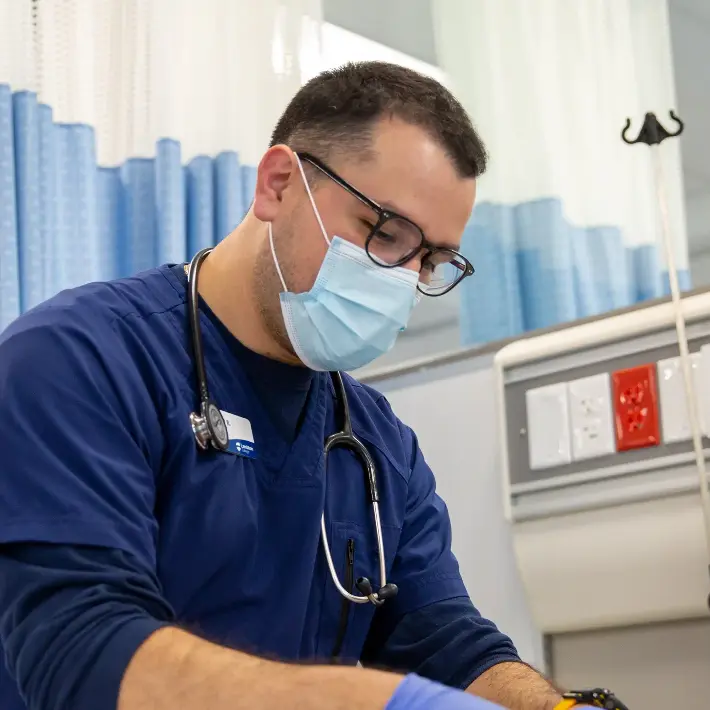
Thinking about a career in health care?
Our Practical Nursing program is a great option, but it is highly competitive. Admission is based on your academic average, and the program requires strong academic and clinical skills.
If you’re applying directly from high school, consider starting with our pathway program: Pre-Health Sciences Pathway to Advanced Diplomas & Degrees (PHDP). This program is designed to help you build the knowledge and skills you need to succeed in nursing and other health care programs.
Hear Why Lucy Enjoys Practical Nursing
Hear from Lucy, a first-year Practical Nursing student. Let her tell you what parts of the program excite her the most.
Highly Competitive Program
This is a highly competitive program and students are encouraged to apply by February 1 - the equal consideration deadline.
Based on the 2023-2024 Admission Cycle, the following data should be considered by future applicants to this program:
Number of students in program
Number of applicants who received an offer
Admission average for first-round offers
Ontario's Learn & Stay Grant
This new grant launched in the Spring of 2023. Students entering the first or second year of either the Bachelor of Science - Nursing or Practical Nursing programs have the opportunity to receive full, up-front funding for tuition, books, and other direct educational costs.
To receive this grant, you are required to work in the region where you studied for a minimum of six months for every year you were funded by the grant.
Meet Celine
Costs
- Year 1 $4,156.71
- Year 2 $5,388.32
Please Note: These fees apply to the 2025-2026 academic year and are subject to change. Fees do not include books (unless specifically noted), supplies or living costs.
Additional Fees
-
WERPN Student Membership$18.00
-
CompTracker (per term)$55.00
-
CPR & FIrst Aid$165.00
-
CPR Recertification$60.00
-
N95 Mask Fit$40.00Every two years
-
Immunizations for Passport to Placement$150.00Depending on prior immunizations
-
Passport to Placement (annual fee)$40.00
-
Police Check & Vulnerable Sector Check (every 6 months)$40.00
-
Uniforms (2)$70.00
-
Uniform Name Tag$25.00
-
Uniform Shoes$100.00
-
Watch with Second Hand$20.00
-
Stethoscope$100.00
-
Registration Fees - Post-Graduate (CNO)$1,200.00
-
Textbooks & Lab Kits$1,500.00Year 1 (includes GPA, NVCI, Strengths Code, lab kits)
-
Textbooks & Lab Kits$500.00Year 2
Travel Expenses
Students are responsible for all costs associated with traveling to clinical placements.
Technology Requirements
In order to keep pace with the requirements of each and every course in your program, Lambton College requires that each student have access to a laptop while studying at our college.
Labs & Equipment
Courses
Fundamental Nursing Skills
This nursing fundamentals course focuses on developing basic nursing skills needed to holistically care for clients. This course provides the theoretical foundation required for Clinical Nursing I with a focus on client and nurse safety and professionalism. The course introduces the student to implementing the nursing process.
Clinical Nursing I
The Clinical lab course will introduce and guide students through clinical practice skills in a Nursing Laboratory. This course provides students with an opportunity to apply complex concepts and nursing theory at a beginning level to specific simulated nursing situations. This course incorporates and emphasizes professionalism, communication, psychomotor skills and group work as they relate to the clinical nursing practice in a variety of settings.
Clinical Life Skills
The clinical life skills course will develop the skills, knowledge, and values fundamental to professional nursing practice within an interprofessional collaborative team. Through a series of in class workshops students will implement the Life skills that will enable effective functioning within their school, work, and home environments. The course emphasizes personal strengths, resiliency, critical thinking, therapeutic communication, conflict resolution, and teamwork skills. Through practical experience and reflective practice students develop the skills to help themselves face the challenges of being a student and future nurse.
Health, Wellness & Nursing Processes
This nursing fundamentals course introduces students to theoretical concepts that form the basis of nursing practice. These include concepts associated with professionalism, caring, cultural care, health promotion, determinants of health and healthy lifestyles. The nursing process is introduced and integrated throughout the course and forms the basis for further development of critical thinking, care planning, and safety in practice.
Human Anatomy & Physiology
This course provides a basic introduction to the structure and function of the human body. The micro- and macroscopic anatomy of each organ system is examined, and the interrelation of physiology is discussed. The principle of homeostasis is taught and utilized when discussing the correlation between the structure and function of the major organ systems. Students apply course content through online anatomy laboratory practice exercises and in class practice.
Critical Thinking & Writing
This writing course challenges students to explore diverse opinions and articulate their own perspectives clearly and persuasively. Through critical reading, students will develop skills in synthesis, analysis, comparison, and response, striving for clarity and diplomatic expression of their opinions based on factual evidence. Students will practice various rhetorical strategies of persuasion and hone their writing to ensure precision and accuracy in their messages. This course lays the foundation for a subsequent research-writing course, equipping students with essential skills for academic success.
Medical Surgical Nursing
Medical surgical nursing is the first of two courses in which the concepts related to the nursing care of an adult with selected health conditions are explored. The health conditions are studied according to body systems utilizing the nursing process to explore the role and responsibilities of the nurse within the inter-professional health care team. This course introduces critical thinking and integration of legal, ethical, and cultural considerations within client centered plans of care.
Clinical Nursing II
In this clinical experience students apply concepts from theory courses and labs and integrate knowledge into clinical practice. Students observe and participate in the nursing care of individuals/families in a variety of acute care, community and simulation laboratory settings. This practical experience focuses on critical thinking and application of the nursing process within the interprofessional health care team. This course facilitates the students' integration of the role of the Practical Nurse into their professional deportment and practice.
Clinical Skills Simulation
This is a skills based lab course presented in a simulated learning environment. In a simulated client clinical situation the student will learn nursing skills and apply the nursing process, nursing theory, use of technology and informatics in the performance of these skills. The purpose of this course is to develop the student's knowledge, skill and judgment to competently perform hands on nursing skills in the clinical environment.
Professional Nursing Practice
This course introduces the CNO standards of practice. Development of professional behaviour is emphasized and the CNO Quality Assurance process is introduced. The role of the Practical Nurse in utilizing evidence to inform their practice is explored. Students learn to differentiate and critique qualitative and quantitative research as it relates to health care. The roles technology and infomatics play in health care and nursing practice are examined. Calls to Action of the Truth and Reconciliation Commission of Canada are examined.
Physical Assessment for Practical Nursing
This course provides the fundamentals of adult physical assessment required for practical nursing students. Students develop proficiency in conducting a health history and physical assessment in a simulated environment in preparation for the clinical setting. The nursing process and assessment frameworks are utilized. Students will demonstrate effective communication skills while integrating respect for client diversity.
Pharmacology for Practical Nursing
The pharmacology course for practical nursing students provides the theoretical knowledge on major drug classifications. The relationship between pharmacologic knowledge and nursing practice is presented. Emphasis is placed on the principles of safe and evidence informed medication practice, the nursing process, the standards of practice, and legal and ethical considerations for practical nurses administering medications.
General Education Elective
Advanced Medical Surgical Nursing
Advanced Medical Surgical Nursing is the second of two courses that develop the fundamental concepts relating to the nursing care of an adult with selected health conditions. The health conditions are studied according to body systems utilizing the nursing process to explore the role and responsibilities of the nurse within the interprofessional health care team. Emphasis on critical thinking and integrating legal, ethical, and cultural considerations within client centered plans of care is provided.
Clinical Nursing III
In this clinical experience students apply concepts from theory courses and labs and integrate knowledge into clinical practice. Students observe and participate in the nursing care of individuals/families in a variety of acute care, community and simulation laboratory settings. This practical experience focuses on critical thinking and application of the nursing process within the interprofessional health care team. This course facilitates the students' integration of the role of the Practical Nurse into their professional deportment and practice.
Professional Accountability
Today's complex and evolving health care environment exposes the Practical Nurse to many health care situations that challenge their role. This course explores the ethical and legal responsibilities of the Practical Nurse within the current health care environment. The College of Nurses of Ontario (CNO) standards of practice, current legislation, and ethical models are used to critically analyze a variety of scenarios. This course prepares the student to write the CNO jurisprudence exam.
Mental Health Nursing
Mental health care impacts Practical Nurses in all practice settings. This course explores mental health nursing care with persons and their families who experience challenges with their mental health. The nursing process is used as a framework to guide nursing care decisions. The promotion of mental health through therapeutic treatment modalities and communication is emphasized.
Communications for Health
This course, designed for students in the health field, further develops students' communication proficiency. Students create workplace documents and research reports and share their findings through oral presentations. Advocacy and peer education will drive the research and documentation process. Current health issues and research will serve as the impetus for creation of informed research reports and presentations.
General Education Elective
Leadership in Professional Practice
The landscape of nursing is evolving rapidly. The increasing scope and practice for the Practical Nurse is encompassing greater responsibilities, including working with Unregulated Health Care Providers and Regulated Health Care Professionals. This course focuses on preparing the student to function as a leader in an interprofessional health care team. Concepts and models of leadership and management as well as teamwork and conflict management are integrated into the curriculum. The student will learn skills to prepare them for writing their registration exam, and entering into professional practice.
Clinical Nursing IV
In this clinical experience students apply concepts from theory courses and labs and integrate knowledge into clinical practice. Students observe and participate in the nursing care of individuals/families in a variety of acute care, community and simulation laboratory settings. This practical experience focuses on critical thinking and application of the nursing process within the interprofessional health care team. This course facilitates the students' integration of the role of the Practical Nurse into their professional deportment practice.
Family Health
The student is introduced to principles and application of the nursing process in the care of maternal and pediatric clients. The obstetric component of this course explores nursing care and health needs for childbearing families during all phases of obstetrical care. The pediatric component of this course follows the age continuum from newborn to adolescent, focussing on health promotion and acute/chronic health issues.
Palliative & Oncology Nursing
The concepts related to caring for a client and their family experiencing cancer and palliative care are explored by the learner in this course. Oncology and palliative care nursing roles and responsibilities within the interprofessional health care team are presented using the nursing process framework. Students will examine current trends in end-of-life and oncology care. The implications of physical, psychosocial, technological, legal, and ethical issues are discussed in relation to client centered care and decision making.
Gerontology
This course explores the experience of aging and issues faced by persons as they age. The physiological, psychological and social changes associated with aging and the role of the practical nurse in maintaining and promoting health among older persons is investigated. Students gain knowledge in gerontological nursing and utilize the nursing process to plan client centered quality care for older people as they experience life transitions.
Community Health Nursing
This course follows a trend in health care addressing the significant shift in client care from hospital base to a community focus. The student will explore how the individual, family and community are affected by health and illness. A community health project allows the students to learn the challenges experienced by vulnerable populations and the relationship of the determinants of health to care delivery. Sustainability and the role of global influences effect on health will also be examined.
Indigenous Contribution to Health & Healing
In partial fulfillment of the Truth and Reconciliation Commission of Canada (TRCC) Call to Action 24 and other health-related Calls to Action, this course provides foundational learning for healthcare providers to be able to provide equitable, non-discriminatory care to Indigenous peoples. Learners will analyze how historical, political, economic, and social forces, including settler colonialism and assimilation practices, have shaped the health and well-being of Indigenous communities today. Learners will critique the Social Determinants of Health looking at the impacts of settler colonialism, including structural and systemic barriers, inequitable healthcare services, and misconceptions about Indigenous peoples. Learners will look to Indigenous rights frameworks, and the unique rights of Indigenous peoples to understand the necessity of Indigenous peoples' self-determination in their health and well-being. Lastly, learners will have meaningful opportunities to reflect on and critique the roles and responsibilities of the healthcare professions and healthcare professionals in addressing settler colonialism and different levels of racism that impact Indigenous peoples. Upon completion of the course, learners are encouraged to pursue additional development opportunities related to Indigenous health and well-being. The integration of previous and concurrent program knowledge is essential for success.
Pre-Graduate Nursing
The course prepares the student to write the Practical Nursing Registration exams. The student demonstrates consolidation of theoretical knowledge gained throughout the Practical Nursing Program by the completion of comprehensive theoretical exams that simulate the REx-PN and College of Nurses of Ontario Jurisprudence exams.
Pre-Graduate Nursing Clinical (Runs mid-April - mid-June - 8 weeks / 250 hrs)
This clinical course is conducted in a variety of health care settings. Students work one-on-one with a preceptor. This final pre-graduate experience enables students to consolidate their learning and demonstrate Entry-to-Practice Competencies for Ontario Registered Practical Nurses.
Contact
School of Nursing
Program Information
After Graduation
Employment Opportunities
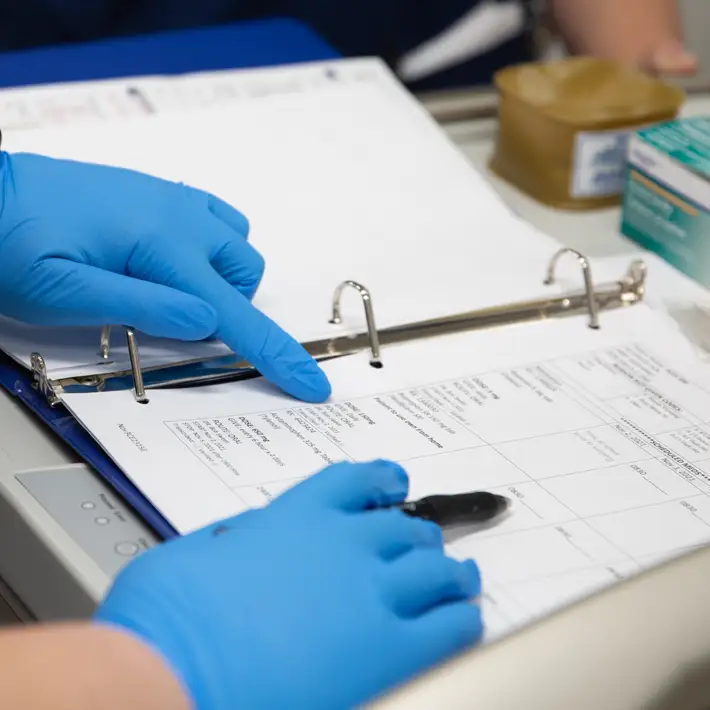
Graduates of this program are successful in finding employment working with a variety of populations. They provide care to individuals with a broad scope of health care needs within diverse working environments, such as, hospitals, long-term care homes, community nursing agencies, public health units, private practices and clinics, industry settings and child care centres.
Graduate Success Stories
Accreditations & Certifications
Certificates & Training
Students in this program will obtain the following certifications as part of the program curriculum:
- Gentle Persuasive Approach
- Non-Violent Crisis Intervention Training
- The Fundamentals of Palliative Care - Core & Enhanced certificates
Pathways
Build on your education and complete a college diploma or university degree in Ontario, Canada, or abroad
Want to see more Ontario transfers? Visit ONTransfer.ca.
Placement

Vaccinations & Police Record Checks
Students considering this program should be aware that there are field placement requirements. All placements require students to have police record checks. Proof of immunizations is also required and must be cleared through Passport to Placement.
Once you’ve applied, you can log in to mylambton.ca and view the program-specific Field & Clinical Placement Requirements. If you need information about these requirements before applying, please contact placementinfo@lambtoncollege.ca.
More Information
Skill Demands
Students should be personally responsible and emotionally mature with an interest in, and motivation toward nursing, and should possess those personal characteristics which would enable them to co-operate with others in the delivery of health care. The College of Nurses of Ontario outlines the requisite skills and abilities necessary to practice nursing in the province of Ontario. Prospective students are encouraged to consider these requirements carefully as part of the preparation to pursue a nursing career.
Meet our Faculty

Cathy Landeryou
Professor, Faculty of Nursing

Christina Gavrelets
Professor, Faculty of Nursing

Diana Pearson
Professor, Faculty of Nursing

Dr. Erin Courtney
Professor, Faculty of Nursing

Dr. Liz Seabrook
Professor, Faculty of Nursing

Dr. Christopher Omira
Professor, Faculty of Nursing

Dr. Sumayya Attaallah
Professor, Faculty of Nursing

Giovanna Good
Professor, Faculty of Nursing

Jacky Day
Professor, Faculty of Nursing

Jennifer Phillips
Professor, Faculty of Nursing

Jennifer Riley
Professor, Faculty of Nursing

Karen Murray
Professor, Faculty of Nursing

Kelly Butler
Professor, Faculty of Nursing

Lee Ann Butler
Health Lab Technologist, Faculty of Nursing

Lori Charron
Professor, Faculty of Nursing

Rachel Posesorski
Professor, Faculty of Nursing

Sherry Forsyth Robertson
Professor, Faculty of Nursing

Taiesha Stewart-Francis
Professor, Faculty of Nursing
Technology Requirements
It is recommended that you use a Windows laptop for your coursework. While other devices like MacBooks or Chromebooks might work for some tasks, they may not support all the software required for your program. If you're unsure, check with your professors before buying.
Internet Speed Requirements
To get the best experience while learning online, we recommend having an internet connection with at least 40 Mbps download speed and 10 Mbps upload speed. This will help you use video calls, attend online lectures, and access other learning tools smoothly.
Because students live in many different areas, we can't suggest a specific internet provider. You'll need to check with local companies to find one that works best for you.
Laptop Requirements
In order to access the internet and virtually-delivered software and courseware, student laptops should include the following at a minimum. By meeting the following specifications, students will be equipped to access software and courseware on their laptop through the internet:
- Intel i5 8th Gen Processor or equivalent
- 8GB of RAM
- 100 GB HDD or more
- Webcam with a microphone
- Wi-Fi capable (802.11n/ac 5GHz)
- Windows 11 operating system
Mobile Device
Students will require a mobile device (smartphone) for:
- Accessing your digital student ID
- Using campus applications and services
Software
To ensure students are getting the most our of their classroom experience, some software will be required.
Lambton College has made this software easily accessible online. Students can leverage our Microsoft Office 365 software packages and services. In addition, much of the software you require for your courses will be available on demand for use on any device - on or off campus.
